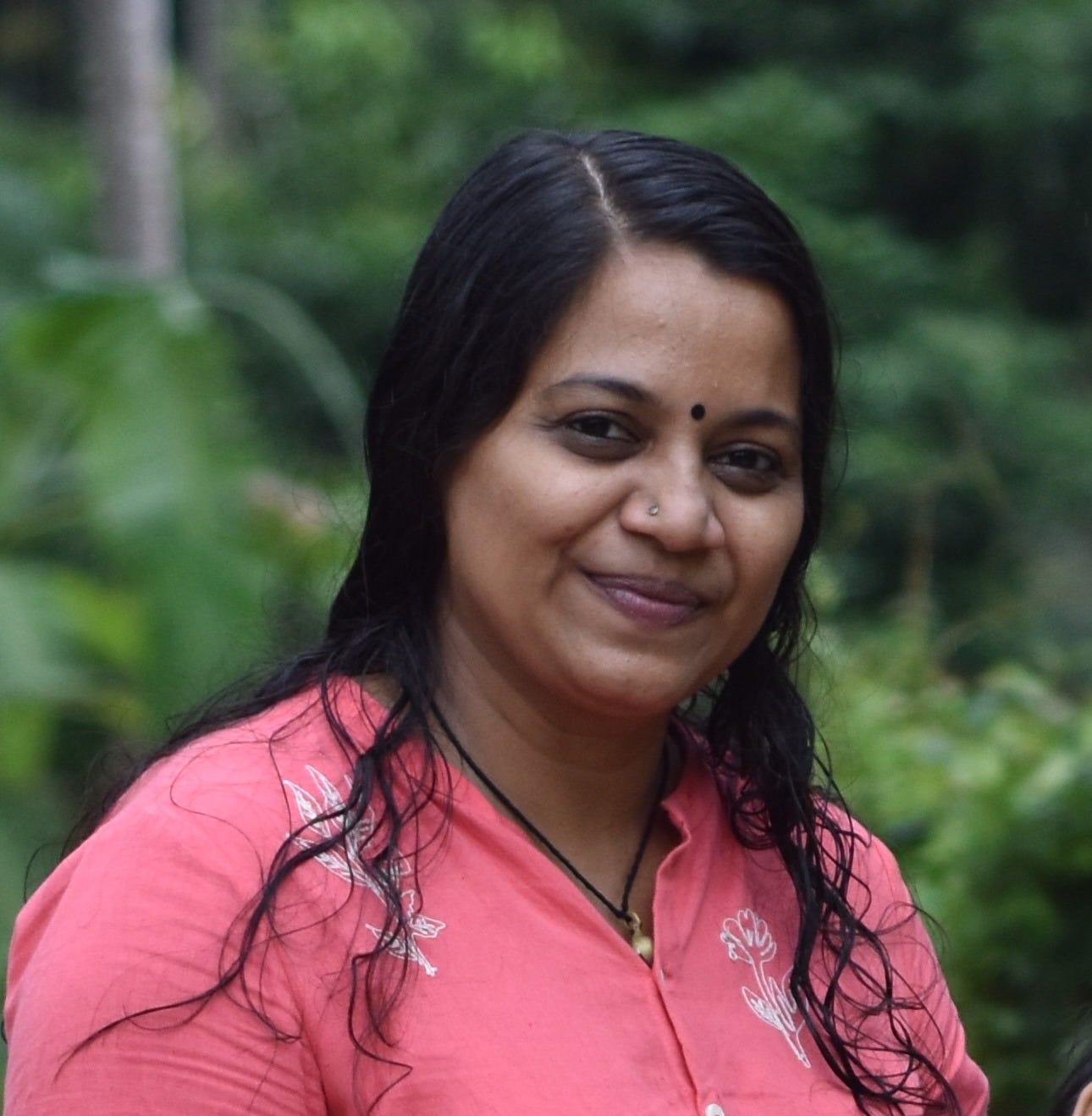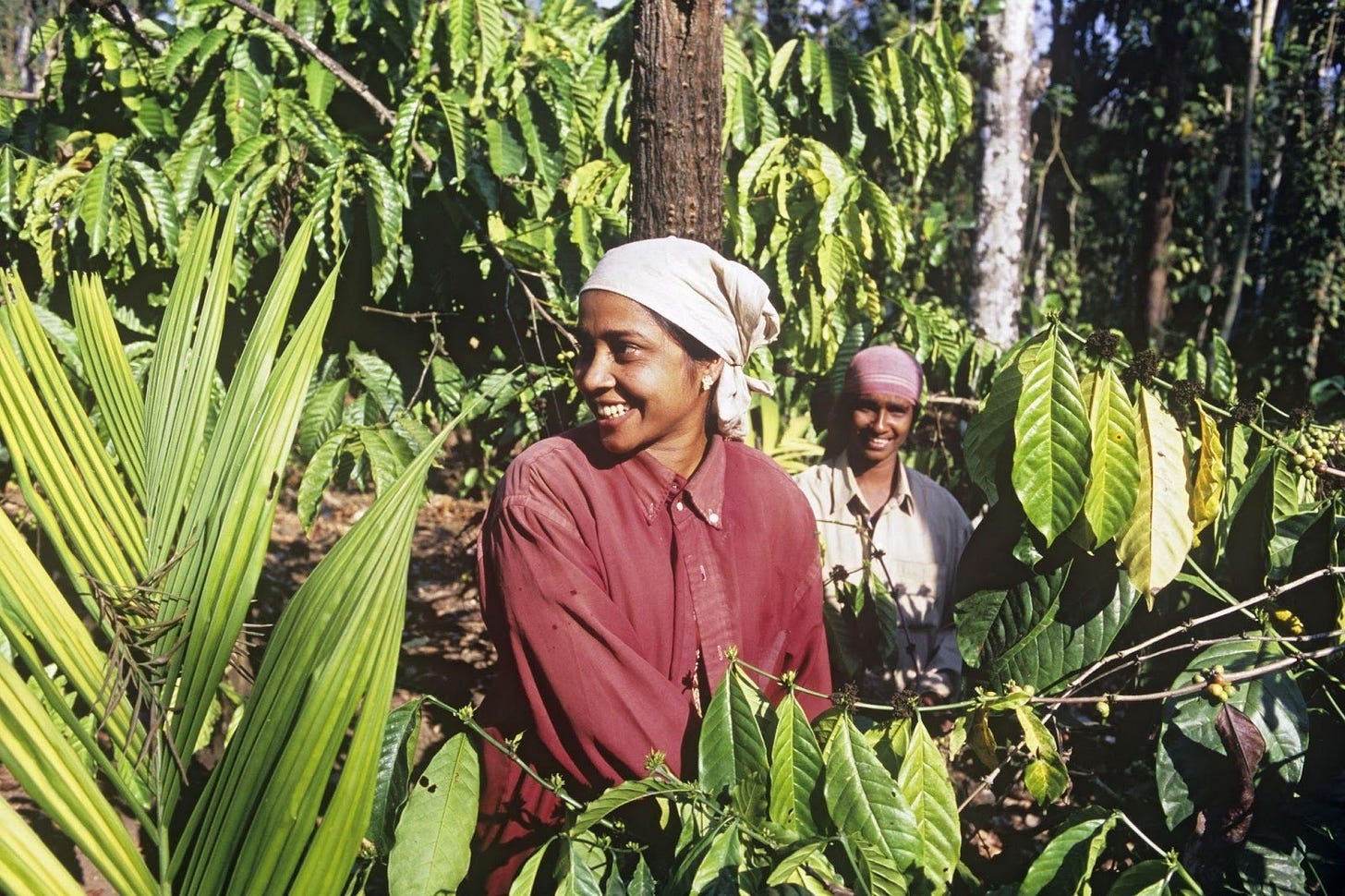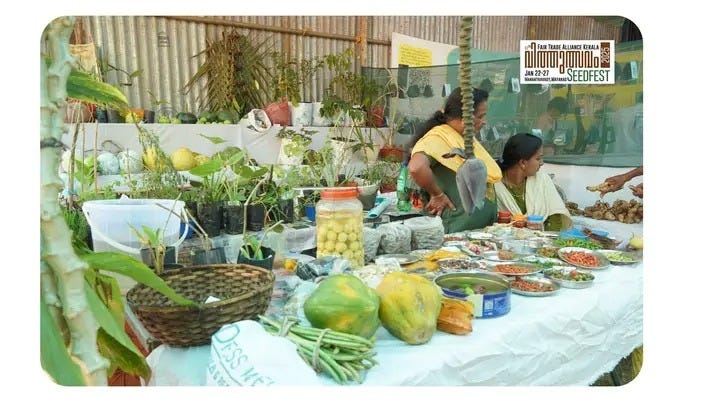“The market dictates, and men are the mediators”
Anuradha Sarang on fair trade for a gender-equal future
Editor’s note: Today’s SPOTLIGHT was created by Aysha Sana, a food researcher who recently finished her PhD at Jawaharlal Nehru University in Delhi. Please read on to learn more about Aysha’s connection to our interviewee, Anuradha Sarang, and the importance of the Fair Trade movement in southern India.
Hello FFJ readers, and welcome to this edition of SPOTLIGHT — I’m Aysha Sana, an India-based food writer and researcher. Today, I’m teaming up with FFJ to feature an interview with Anuradha Sarang, the CEO of Fair Trade Alliance Kerala (FTAK), an organic farmers’ organization based in the Malabar region — part of the Western Ghats, one of the world’s most important biodiversity hotspots — in Kerala, India’s southwestern coastal state.
As a food studies scholar from the region and a frequent visitor to Kozhikode city’s Elements Organic Store and Cafe1 — the founder-promoter and trading partner of FTAK — I have been following FTAK’s work with great enthusiasm. I first connected with Anuradha in early 2024, when she was appointed as the CEO. We talked about the Fair Trade movement2 and various initiatives under FTAK, her new role, and possible avenues for collaboration.
FFJ’s SPOTLIGHT series was the perfect opportunity to speak with Anuradha more in depth about what the organization means for women and indigenous communities, and how trade justice is central to building an inclusive and equitable food system. In our interview, she reflects on the consequences of women’s alienation from the agricultural landscape and how bringing them back into leadership is crucial to undoing the many injustices embedded in the modern food system. – Aysha Sana
Aysha: Could you tell me a little about your own journey — what brought you into organizing around farming and food systems, and to Fair Trade Alliance Kerala (FTAK), where you now serve as its first CEO?
Anuradha: I trained as a civil engineer, but very early on, I chose to work in the development sector. I worked on ecological sanitation with Paul Calvert and with Indigenous communities in the Nilgiris, in the Western Ghats of India, at Keystone Foundation — a non-profit focused on livelihood security and food security, as well as land and community rights.
Later, for a big part of my career and life, I was part of Sarang3 in Palakkad, which was one of the first of its kind, whether in educational or agroecology experiments.
I have always considered myself an ally to smallholder farmers, who are at the core of sustainable food systems. Over the years, I have also served on the Managing Committee and the National Steering Committee of Organic Farming Association of India (OFAI) from 2010 to 2016, and was part of the Inter-Continental Network of Organic Farming Organizations (INOFO).
As a natural extension of my work and learning, I gravitated towards working directly with smallholder farmers. I find it exciting to work with and learn from not only farming families but also the fair trade supply chain, right down to the mindful consumer.
Aysha: For readers who may not be familiar with FTAK, could you share a bit about its origins, its vision, and the communities it works with?
Anuradha: Established in 2005, FTAK is an organization of smallholder farmers drawn from the hilly regions of the Western Ghats of Kerala, India. FTAK was born at a time when farming as an activity, and the peasantry as a social segment, were being relegated to the margins of society. Agrarian Kerala was then reeling under the double impact of a steep fall in commodity prices and crop failures. Agrarian debt mounted, and farmers were resorting to desperate measures, unable to cope.
A motley group of farmers — most of them representatives of mass peasant organizations fighting agrarian indebtedness and the devastating impact of neoliberal policies on the peasantry — came together on December 17, 2005, at the Elements Organic store and Cafe in Kozhikode, North Kerala, and formed FTAK.
FTAK’s mandate is to secure fair market access for its members’ farm products, using the enabling provisions of Fair Trade as a global movement for trade justice. Under Fair Trade principles, farmers are assured a fair price for their products, and sustainable farming ensures that agriculture protects and nurtures both the land and the workers.
Many of FTAK’s farmers reside within the Nilgiri Biosphere, a global biodiversity hotspot. The environmental sensitivity of our farming operations is critical for the future of a climate-challenged planet. Realizing this, as an organization we have been pursuing what we call the Fair Trade+3 mandate, focusing on three interconnected aspects of Fair Trade: biodiversity, food security, and gender justice.
Aysha: Women and indigenous communities form the core of FTAK’s members. Could you talk about how the roles they play in the food system have changed over time?
Anuradha: The southwestern coastal state of Kerala in India is known for its balanced homestead farm agroecological system. Pepper vines thrived in the homestead farms of the Malabar region, alongside probably a hundred other crops, each with immense nutritional, therapeutic, and nutraceutical value.
A homestead farm in Kerala was a veritable forest farm. In fact, it was a nuanced, evolved, and intricately engineered system whose nerve centre was the family kitchen. And the matriarch — the woman — was the dominant decision-maker: what grew, what was for the family’s consumption, what was to be stored for the rainy days, what was to be shared with neighbours, what was to be fed to animals, and what, if any, remained, the men could take to the market to earn cash returns. This forest farm, this treasure trove of biodiversity, this reservoir of food security, is what characterized farming — but is now a thing of the past.
What spoiled these dynamics? The market! The modern agricultural market, as we know it today.
Suddenly, the power equations in the homestead changed completely. In industrial agricultural production, women have little say in the affairs of the farm. The market dictates, and men are the mediators. A tangible assertion of women’s role in the smallholder farming economy cannot happen unless we recapture their position in managing the homestead farming system. The gender issue thus automatically becomes a biodiversity issue and a food security issue. Wars over food and water, higher tariffs, exploitation of human and natural resources, unfair trade, and so on — these are toxic masculine traits embedded in the food system.
Aysha: How are you working to address the barriers that women face in participating in a more equitable and inclusive food system? What challenges remain?
The ownership of farmland is considered the key eligibility criterion for membership in most farmer organizations in India. The organizational space of farmers’ collectives across the country — and in most parts of the world, no wonder — is still occupied predominantly by men. Patriarchal land ownership structures deny and hinder women’s agency in the management of the farm.
FTAK decided that it couldn’t wait for the larger structural changes related to land ownership for women to claim their rightful space in the organization. From its very inception, membership in FTAK has been open to any adult member of the farming family, irrespective of gender and land ownership status.
However, looking back at our initial years as an organization, we recognize that what we considered to be pathbreaking inclusive membership criteria has not ensured active participation of women. Further affirmative action, such as reserved positions in the Central Committee and the Governing Board for women, has only risen by a few notches above tokenism. We are aware of the serious gender imbalance in our organizational structure, and even more profoundly, in our organizational culture, and we are adopting various measures to bring about deeper gender balance.
For instance, with the aim of bringing more women to leadership roles, women now manage many of the produce collection stations. Another successful initiative of ours is the interest-free Fairtrade Premium Fund, through which women have been actively investing in and taking charge of their homesteads.
Aysha: Seed sharing and knowledge exchange have been central to FTAK’s work, including its flagship Seed Festival (SeedFest) event. What is the vision behind SeedFest, and what impact has it had?
Anuradha: FTAK has been hosting SeedFest under the overarching theme of Seed Swaraj (Sovereignty) since 2012. SeedFest has become an important part of the agrarian calendar of the Malabar region over the years, and it is well-attended by the sustainable farming community of Kerala, as well as seed savers across South India.
SeedFest emphasizes the message of trade justice, farmers’ rights over seeds, and the need for protection and preservation of indigenous varieties. It’s an occasion to exchange and buy indigenous seeds, acquaint themselves with the seed and crop diversity of the land, and get introduced to — and join — seed conservation efforts by organizations, groups, and individuals.
The event facilitates displaying, exchanging, and preserving all sorts of seeds, planting material, indigenous livestock, medicinal plants, and indigenous and wild trees. It is also a venue for discussions, where the community shares experiences and knowledge related to the preservation and propagation of indigenous seeds.
With SeedFest, we’re visualizing a plan for the near future — one that helps mitigate and repair the continuing damage to the delicate web of life on Earth, including finding ways to rebuild rural livelihoods. The festival is a place where rural and urban stakeholders can come together to make this plan a reality.
Aysha: The Western Ghats, where FTAK is based, are a vital ecological corridor but also a region under severe threat. How do these environmental challenges shape your work, and how does FTAK respond to them?
Anuradha: We are witnessing countless catastrophes — erratic weather patterns, natural disasters, depletion of soil, and disrupted social patterns — which could very well lead to the collapse of the world as we know it. For a grassroots organization like FTAK, working with farmers who are bound to be the first and worst hit, we must develop a counter-plan.
Components of this plan include: adoption of 100% organic farming systems; mapping boundaries between farms and forests; actions to understand soil health and nourish our depleted soils; training in ecologically sensitive farming techniques; and building a rapport with consumers to help elevate products like our Forest Coffee and Biodiversity Friendly Pepper.
Aysha: Looking ahead, what future do you imagine for small-scale farmers and for FTAK? And how can people who care about food justice and gender equity stand in solidarity with this work?
Anuradha: For small-scale farmers, the future will involve a complex mix of challenges and opportunities, influenced by climate change, technology, and evolving markets. While many will face pressure to adapt or exit the industry, leveraging new methods and networks will be essential for building sustainable and profitable livelihoods.
The future of smallholder farming — and efforts to make it a viable and dignified pursuit for the youth in the Global South — depends on institutionalizing three key income streams for crop-diverse homestead farms: ensuring fair prices for farm produce, monetizing the ecosystem services these farms provides, and recognizing the value of the topographical preservation they maintain. Achieving this will require policy-level interventions forced by coordinated peasant activism at a global scale.
As a grassroots-level organization, FTAK thus actively works to bring youth and women into farming, collectivize farming activities, restore soil health, preserve indigenous seeds and plantlings for future generations, and also adopt technology, like micro-weather stations, to face erratic climatic changes.
What you can do as an ally is to deliberate on your food choices. Zero in on choices that are healthy, safe, wholesome, environmentally sensitive, and considerate of those who grow, process, and distribute it.
Aysha: Is there anything else you would like to share with us?
Anuradha: The true cure for the challenges we are facing is care. Care deeply about the land, the people, and everything that makes up life around you, and take up any opportunity to act on it.
Interested in finding out more about products made by FTAK’s partner companies? Check out Pakka (Switzerland), Liberation (United Kingdom), Crowd Container (Switzerland), Ethiquable (France), Altra Mercato (Italy), Roellinger Epices (France), Equal Exchange (USA), TradeAid (New Zealand), Premsoul Biochai (Switzerland), DR Wakefield (United Kingdom), Amlachai (United Kingdom), and Halba (Switzerland).
Note: FFJ has not been sponsored to highlight these, nor is this an official endorsement of these products!
Dr. Aysha Sana is a researcher and writer whose work explores everyday politics of food—how food practices and narratives shape identity, belonging, and political expression. Aysha holds a PhD from Jawaharlal Nehru University, India and serves on the board of the Indian Network of Food Studies, an interdisciplinary platform advancing food scholarship across India and South Asia.
Anuradha Sarang is the Chief Executive Officer of FTAK and is a community motivator, educator and writer. Before FTAK, Anuradha has been part of various grassroots level ecological organisations like Keystone Foundation. She has also served on the Managing Committee and National Steering Committee of Organic Farming Association of India and is part of global farming coalitions like Inter-Continental Network of Organic Farming Organizations (INOFO).
Elements, a one-of-a-kind, experimental store in the heart of my city, Kozhikode, was founded in 1999, when the world was still waking up to the ideas of organic production and sustainable consumption. According to co-founder Tomy Mathew Vadakkancheril, who started the store with his wife Seepja, Elements was meant to bridge the physical as well as the emotional distance between the sensitive farmer and the conscious consumer.
Fair Trade is an organised social movement and market-based approach that aims to help producers in developing countries to obtain better trading conditions and promote sustainability. Generally, farmers and workers at the beginning of the chain do not always get a fair share of the benefits of trade. The primary principle of Fair Trade is to ensure that the farmers who are at the beginning point of the supply chain are adequately compensated as being part of the Fair Trade community.
Sarang School founded in 1982 in India’s Attapadi hills of the West Ghats, is one of Kerala’s pioneering alternative learning spaces based on athijeevanam (survival) and upajeevanam (livelihood). Sarang’s visionaries Gopalakrishnan and Vijayalakshmi, both school teachers, believed that the current formal education not only limits children’s horizons but also doesn’t prepare them for a holistic living. At Sarang they set out to redefine education through the concept of learning by knowing rather than rote, exam oriented learning. Education according to them also has to be affordable, sustainable, humane, nature-based, and most importantly, child-friendly learning. Sarang’s 12 acre campus was also a space for experimental agroecology of which its students were also a huge part.




